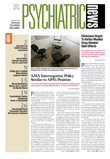Many Louisiana children affected by Hurricane katrina show signs of resilience today, but many others display continuing psychiatric symptoms 10 months after the storm.
“Among key issues that affect children are their ability to trust adults to keep them safe,” said psychologist Joy Osofsky, Ph.D., a professor of pediatrics and psychiatry at the Louisiana State University (LSU) Health Sciences Center. She spoke at a meeting convened by the Substance Abuse and Mental Health Services Administration in New Orleans in May.
“Children's reaction mirrors their parents'. Whenever it rains, whenever there's any kind of storm, like a recent tornado, we see lots of separation anxiety.”
Some kids are clingy, worry about what is going to happen, talk repeatedly about the hurricane, or are upset, afraid, or sad when thinking about the event, she said. They feel that nothing is fun and have a hard time getting along with friends and family now. The hardest-hit group may be high school students, who not only miss their friends but also worry about their ability to get into college.
Screening organized in St. Bernard Parish by Osofsky and her husband, Howard Osofsky, M.D., Ph.D., professor and chair of psychiatry at LSU, found that 54 percent of children met criteria for mental health referral, and 14 percent directly requested counseling. They also learned that 34 percent of the youngsters were separated from their primary caregiver, 14 percent had friends who had died because of the storm, 45 percent had parents who were unemployed, and 33 percent had symptoms of PTSD or depression. Even today, many students don't live with their parents because the adults are working elsewhere, said Joy Osofsky.
“We're seeing a `slow burn' of PTSD and continuing symptoms with a slow recovery and a continued desolation,” she said. “Some behavioral and emotional reactions may be `normal' or represent a `new normal' after such a widespread disaster with continuing anxiety.”
Young people are anxious about the ongoing uncertainty in their lives, an anxiety compounded by the onset of the new hurricane season that began on June 1. Many have had trouble concentrating in school and have become disruptive. Schools that take a zero-tolerance approach to behavioral problems expel children who act out.
On the positive side, children want to resume normal life and their prehurricane activities, enjoy going back to school and being with other children, and show more resilience with support from their parents.
In her work immediately after the storm, Osofsky found that her training in trauma work was a help, but more important was just being there for young people, she said. “Listening, gathering information is a key. When they heard their own concerns, they felt better.”
As part of the Louisiana Spirit program that he heads, Howard Osofsky said, children returning to schools that reopened in St. Bernard and Orleans parishes were screened, resiliency-building programs were set up, and treatment provided when needed.
Even before the storm, many children in New Orleans lived in areas of preexisting trauma, with subsistence-level poverty, crime, and bad general health, said Jay koonce, M.S.W., L.C.S.W., clinical manager of a substance abuse treatment center in Austin, Texas. koonce helped coordinate mental health services for evacuees in that city. “They endured a traumatizing experience of being victimized by nature and abandoned by society. They experienced trauma, on top of trauma, on top of trauma.”
Koonce's watchword for helping evacuees was: “Meet them where they are.”
He found that mental health professionals could either wait in designated areas for guests (as he called the evacuees) to self-refer or be brought in by police or medical staff, or they could take to the shelter floor and roam about, finding people who needed help. The latter approach was much more productive, he said.
Going to those who needed help remained the favored tactic in Austin. In the months after the storm, as people moved out of shelters, students were enrolled in the city's public schools. A Communities-in-the-Schools katrina Project was established, funded by private corporations for a year to coordinate school-based counselors and case managers.
During the school year, the school was the place to connect with families, said koonce. Now that school is out, the home is the locus of contact.
“Asking parents if they need psychological help may meet with resistance, but we have more success if we say to them, `Why don't you come in and let's talk about how to help your kids?' then open up the discussion to include the parents' mental health and how it affects their children,” he said. ▪
